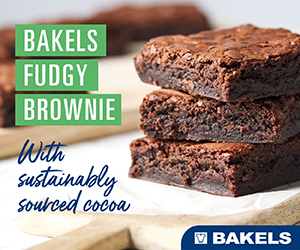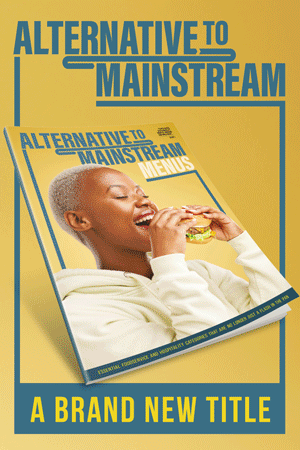STORY: INTERVIEW: Speciality Breads
Speciality Breads MD Simon Cannell reveals how his business has propelled itself to the forefront of free-from – with Vegan Society accreditation for more than half its products – and a newly nut-free factory

Margate is an epicentre of nostalgia in Kent. Its weary promenade has been inundated in recent years with artists and entrepreneurs looking to inject fresh vitality into its bustling – and at times delightfully kitsch – streets. It’s indicative of the gentle regeneration happening around the country; people are simultaneously turning to their smartphones for more purchases than ever, yet they still strive for genuine human interaction.
The food businesses that tuck themselves into Britain’s high streets, working around the clock to create quality products that deliver memorable experiences, are keeping the spirit of shopping alive.
“We bought a deli at the end of August last year in New Romney,” Simon Cannell, MD of Speciality Breads (which bakes and operates in Margate) tells me. “We have two brands – Baker’s Bicycle is our retail brand, selling a small range of our frozen breads into small farm shops and deli outlets. The deli was driven on the back of that.”
For those of you who caught the BBC documentary The Truth About Carbs last year, and digested the following media stories, you’ll know that frozen bread’s health credentials have remarkably improved (it turns starch into resistant starch, which means less calories, hurrah). But running a wholesale bakery business with a small retail arm focused on frozen bread still requires educating the end consumer, according to Cannell.
Speciality Breads mainly sells its frozen bakery products to wholesalers, who then supply the foodservice and hospitality worlds. Those operators need no persuading on the benefits of frozen bread. But trying to get this message across to customers in a deli is another matter.
“There’s a leap you need to take to convince them about frozen,” Cannell says. “Having the deli helps give us more of an explanation. So, we plan to open more. The thing that’s been a real eye-opener is that it’s given us insight into the ways that people shop in that environment.”
The four local staff members know their customers by name, and offer friendly, genuine interaction with each transaction.
“It’s how I remember my mum shopping when I was little kid,” he adds. “It feels like people are going back to this way, they have more appreciation for wanting to know where their food has come from. If you know the people who made it or are a bit closer to the people who made it, then you’re going to have more confidence in the product.”
Speciality Breads strives to build confidence in its bakes from its wholesalers and operators, which is why you’ll see its Red Tractor, British ingredients and BRC AA credentials splashed all over packaging, marketing collateral and more. But when you’re a baker continually navigating a three-way supply relationship, it’s a challenge to ensure your core messaging doesn’t become diluted along the chain.
Just the veganning
“We’ve had a really good start to 2019, currently trading 30% up on last year,” Cannell explains. “We had a real focus last year on growing our national account business. We’re not going after Wetherspoon and McDonald’s – we’d have to spend two weeks producing half a day’s stock for them, it wouldn’t work. But small to medium chains are a perfect fit for us and as we do a lot of things that others can’t do. We tend to be the bakery of choice for more awkward stuff because we’ve got labour. A lot of our products are hand finished, so when someone wants something a little different, we can do that well.”
It’s difficult to thoroughly understand the sales patterns of frozen bakery – while national accounts tend to trade more consistently throughout the year (unaffected by weather and the like) – sales can spike if storage space frees up, for example. But Cannell has his own suspicions as to why sales are so good already.
“Another thing that’s starting to make headway now is our vegan range,” he notes. “It’s a constant conversation we’re having with people and the numbers keep
going up.”
Cannell is proud of the hard work the Speciality Breads team has put into gaining its official Vegan Society accreditation at the end of 2018, rather than just launching a few vegan options.
“We went through all our existing products to see what was vegan, and it came back as a sizeable number,” he tells me. “So out of around 120 SKUs, about 90 or so were originally thought to be suitable for vegans, on the basis of it having flour, salt, water and yeast, and us managing cross-contamination risks – we’d checked ingredient labels and thought it was okay.”
But self-declaring bakery products to be suitable for vegans didn’t sit well with Cannell, who wanted to back up the claims with proper accreditation, and so he turned to the Vegan Society.
“They are very sensible in their approach to promoting a plant-based diet,” he says. “Whether it’s one day a week or 365 days a year. There’s no desk-thumping, which we thought was great. They have a fantastic reputation among vegans as well and are very much seen as being the people who represent vegans well with a balanced view.”
Going through the process of registering Speciality Breads’ products with the society threw up some rather interesting things for Cannell and the team.
“Sugar, for example, is sometimes refined through bone char,” he highlights. “There is potential for these things to creep in. If we hadn’t gone down the route of doing this properly, we could have been saying that some of products were suitable for vegans when they weren’t.”
Thankfully, more than half of Speciality Breads’ offering now sits under the official accreditation and can confidently be marketed as vegan.
“These products are still made in the same way, and with the same quality, with the added bonus,” Cannell says. “Very serious vegans know their stuff and I worry that the next big PR disaster will be somebody selling a product as vegan but cannot back this up when challenged.”
Garden of Eden
Just because a healthy portion of Speciality Breads’ existing products fit into the vegan category, doesn’t mean Cannell is ready to settle down on the NPD. The vegan Eden burger bun was launched recently and is the result of much analysis of the food industry.
“It’s very soft because we use potato,” he explains. “We wanted a vegan burger bun that had a brioche external look to it, as that’s still where the market is, but not to look like a brioche inside. Yeast loves potato, so it makes for soft bread. The vegan glaze we use has a thinner consistency, so we had to amend our processes to cope.”
The Eden burger bun is designed to be sturdier than a brioche, as Cannell notes: “The amount of times you are holding a burger and wonder, ‘Where did the bun go?’.”
So many plant-based burgers are circulating British menus, so having a vegan carrier option that aligns neatly with vegan meals but also complements other dishes is easier for operators to stock. Plus, any burger bun that doesn’t disintegrate is a winner in my books.
Speciality Breads’ brioche roll and ciabatta are generally the best sellers currently, but with dietary choices changing around the UK, will the Eden bun tackle the brioche for glory?
“We are definitely at the premium end of the market,” Cannell notes. “The difference in time making our product is huge. From start to finish, it could be two and a half days, and we have people hand-stretching the dough, which sits there creating wonderful aromas and textures.”
Changing the nuts and bolts
This year was destined to be a period of evolution for Speciality Breads, and Cannell was keen to do things differently in 2019. Two lines of questioning were constantly making their way into the business from customers around vegan products and allergens. Notably, from larger customers, was the request: ‘Do you have nuts on site?’
“We only had nuts in two products that we sold,” Cannell explains. “A walnut bloomer and a mini walnut tin loaf. We looked at the figures and we realised we were adding an allergen into the business for a relatively small amount of sales. We were potentially putting off a large number of customers by having nuts on site.
“So, we said ‘let’s get rid’,” he continues. “We’ve changed the Mediterranean selection roll, which now has onion to replace the walnut. I don’t want to go down the route of removing all allergens, like sesame, for
example. It is not worth getting rid of, as the volumes we do of products with sesame are quite significant. From here on in, if anyone came to us with a request for something with nuts, the answer will be no. I think it’s an added extra for our customers.”
Change is healthy, and when society or cultural shifts alter buying decisions, that should signify the opportunity for bakers to see what changes they can make – be it drastic or subtle – to reflect that.
“Bread is coming back again, which is good,” concludes Cannell. “People can only demonise a category for a certain period of time before they get bored and move on. Sometimes I think, ‘Hang on, we’re not manufacturing cigarettes’.
“This is a wholesome product that’s made using British ingredients in a
traditional manner. There are no weird nasties going into it. This is a food we should
be celebrating.”







